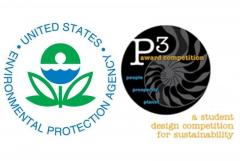Samueli School Student Project Receives Award from U.S. Environmental Protection Agency
Professor Sunny Jiang leads student team to EPA award

A student group advised by Professor Sunny Jiang, Ph.D., Department of Civil and Environmental Engineering, proposed a project entitled "Microbial Desalination Fuel Cell as a Sustainable Technology for Renewable Water and Power" that has been awarded a $15,000 award from the U.S. Environmental Protection Agency (EPA) as part of the agency’s P3 (People, Prosperity, and the Planet) design competition. Jiang is the director of the environmental engineering graduate program at The Henry Samueli School of Engineering.
The student team wants to design a microbial desalination fuel cell (MDFC) as a pretreatment to current seawater desalination plants that will provide sustainable freshwater supply for human consumption at minimal energy cost. A MDFC utilizes bacteria to generate energy and the electrodialysis membrane to desalinate water at the same time. Their goal is to reduce energy consumption with the MDFC’s ability of desalinating seawater before the seawater enters the energy-intensive reverse osmosis (RO) desalination process. The process would also reduce pollution and waste discharge by utilizing organic waste in the human sewage. Ultimately, the bacteria in the MDFC would produce energy to help offset the energy use in RO.
“We hope to use this as an educational model to the public on innovative technology that would achieve economic, societal and environmental sustainability,” said student leader Linda Y. Tseng.
Tseng is joined on the team by fellow graduate students Joshua C. Gellers, Errol M. Glenn, Siqian Huang, Xiao Huang, Matthew K. Jeung, Luman Jiang, Leda Katebian, Keah Ying Lim, Reza Sobhani, Haiping Wang and undergraduate student Yanwen Wu.
For the next phase of the EPA P3 competition, the team will travel this April to Washington, D.C., for the 8th Annual National Sustainable Design Expo on the National Mall tocompete for the P3 Award and a grant of $90,000 to develop their design for a real world application.
The EPA P3 competition encourages students to design creative solutions to sustainability challenges in the developed and developing world. P3 offers students quality hands-on experience that brings their classroom learning to life. Through this program, students can “benefit people, promote prosperity and protect the planet” by designing solutions that move us toward a sustainable future.
The National Sustainable Design Expo is a unique opportunity to discover innovative, cutting-edge technologies developed by university students and their faculty advisors, learn what nonprofit organizations and government agencies are doing to advance sustainability, experience sustainable products that are currently available, and recruit talented hires with backgrounds in the broad range of disciplines found the sustainability arena.
